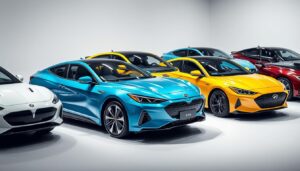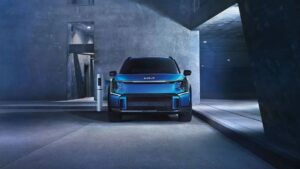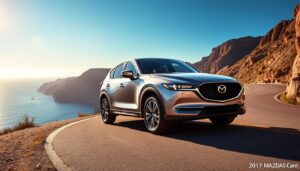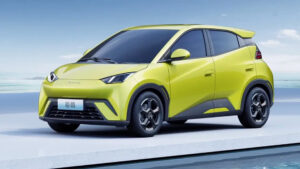
Hybrid vs Electric Vehicles
The world of cars is changing fast. Now, people talk a lot about hybrid vs electric vehicles. They want cleaner, better cars. But, which one is best for you? Let’s look at what matters most.
Key Takeaways
- Hybrid cars mix a regular engine with an electric motor. They’re good at saving fuel and driving well.
- Electric cars run only on batteries. They don’t pollute and are better for the planet.
- Think about the cost, value over time, charging spots, and how they drive. These are key when picking a car.
- The best car for you depends on your needs, how you drive, and what you like.
- Knowing the latest in car tech helps you choose wisely.
Understanding the Basics: Hybrid and Electric Vehicle Technology

The car world is changing fast. Now, we see more hybrid and electric cars. They offer many choices for how we get around. Let’s look at what makes these cars special.
How Hybrid Powertrains Work
Hybrid cars use both a gas engine and an electric motor. The electric motor gets power from a battery. This battery can be charged when you brake or by the engine.
This mix of power makes hybrids better for the environment and your wallet. They use less gas and pollute less.
Pure Electric Vehicle Systems
Pure electric cars, or EVs, only use an electric motor. They don’t have a gas engine. Instead, they have a big battery to store energy.
EVs are great for those who care about the planet. They don’t make direct pollution. This makes them a popular choice for many.
Key Component Differences
Hybrids and EVs are different in what makes them go. Hybrids have a smaller battery and a gas engine. EVs need a bigger battery and only an electric motor.
Also, hybrids have a more complex setup. They mix a gas engine with an electric motor. EVs are simpler, with just an electric motor.
| Component | Hybrid Vehicles | Electric Vehicles |
|---|---|---|
| Powertrain | Combination of internal combustion engine and electric motor | Fully electric motor |
| Battery Pack | Smaller battery capacity | Larger, high-capacity battery pack |
| Emissions | Reduced emissions compared to traditional internal combustion engines | Zero direct emissions |
Knowing the differences between hybrids and EVs helps you choose the best car for you.
Environmental Impact and Emissions Comparison

Hybrid and electric vehicles have their own pluses and minuses for the environment. Knowing how they compare in emissions and carbon footprint helps people choose wisely.
Hybrid cars mix a gas engine with an electric motor. They often emit less than gas-only cars because they use electric power for short trips. But, making hybrid cars can harm the environment more than regular cars. This is because making batteries and electric parts needs a lot of energy and resources.
Electric vehicles don’t emit any direct pollution because they don’t burn fuel. They’re better for the planet for daily drives. Yet, how green an electric car is depends on where it gets charged. If it’s charged with clean energy like solar or wind, it’s much better than gas cars. But, if it’s charged with energy from fossil fuels, its green benefits are less.
| Metric | Hybrid Vehicles | Electric Vehicles |
|---|---|---|
| Emissions | Lower than traditional gasoline-powered vehicles | Zero direct emissions |
| Carbon Footprint | Depends on manufacturing and energy sources | Depends on electricity source for charging |
| Environmental Impact | Reduced, but higher than electric vehicles in some cases | Significantly lower, if charged with renewable energy |
In short, both hybrid and electric cars can cut down on emissions and environmental impact compared to gas cars. But, their carbon footprint varies based on many factors, like the energy source for charging or powering.
Initial Purchase Costs and Long-term Value

When you think about buying hybrid or electric cars, the price is key. Electric cars might cost more at first than gas cars. But, they can save money in the long run. This part will look at the money side of owning these cars, like the price, how much they lose value, and insurance.
Purchase Price Analysis
The price of hybrid and electric cars changes a lot. It depends on the car’s make, model, and features. EVs usually cost more because of their special batteries and electric parts. But, they can save money on fuel and upkeep over time.
Depreciation Rates
How much a car loses value is important. Hybrid and electric cars tend to lose value less than gas cars. This is because their tech gets better, and more people want them. This means they might keep their value better, making them a good choice for some.
Insurance Considerations
Insurance costs for hybrid and electric cars are also a big deal. The car’s advanced tech might mean higher repair costs. But, many insurers give discounts or special coverage for these cars. It’s smart to compare insurance prices to find the best deal for your budget and future plans.
Fuel Efficiency and Operating Costs

Hybrid and electric vehicles have big advantages in fuel efficiency and costs. Hybrid cars mix a gas engine with an electric motor. This gives good fuel use and performance. Electric cars use only batteries, which means they use less energy and don’t pollute.
Fuel Efficiency: Hybrid vs Electric
Hybrid cars are very fuel-efficient, often getting up to 50 miles per gallon. They use the gas engine and electric motor smartly. Electric cars, on the other hand, use very little energy, often getting over 100 MPGe.
Operating Cost Comparison
The costs of owning hybrid and electric cars differ. Hybrid cars save money on gas compared to regular cars. Electric cars cost less to “refuel” with electricity. But, electric cars usually cost more to buy upfront.
| Metric | Hybrid Vehicle | Electric Vehicle |
|---|---|---|
| Fuel/Electricity Efficiency | ~50 MPG | ~100 MPGe |
| Fuel/Electricity Cost | $2.50 per gallon | $0.13 per kWh |
| Maintenance Costs | Moderate | Low |
| Overall Operating Costs | Moderate | Low |
The table shows how hybrid and electric cars compare. Electric cars might cost more to buy. But, they save money in the long run because they use less energy and cost less to “refuel”.
Charging Infrastructure and Convenience
Electric vehicles (EVs) are becoming more popular. The need for good charging spots is key for buyers. Charging EVs is different from refueling hybrids, with both good and bad sides.
Charging at home is a big plus for EV owners. Many put in a Level 2 charger in their garage. This fills the battery overnight, unlike hybrids that need frequent gas stops.
But, for long trips, public charging spots are a must. The number and spread of these stations vary by area. Drivers need to plan their routes and stops for smooth travel.
Charging Time Comparison
| Charging Type | Time to Fully Charge | Typical Use Case |
|---|---|---|
| Level 1 (Household Outlet) | 8-24 hours | Overnight charging at home |
| Level 2 (Dedicated Charging Station) | 4-8 hours | Home or workplace charging |
| Level 3 (DC Fast Charging) | 30 minutes to 1 hour | Public charging during longer trips |
Charging EVs takes longer than hybrids, but home charging and public stations are improving. As charging spots grow, charging EVs will get easier and more convenient.
Real-World Performance and Driving Experience
Hybrid and electric cars have their own strengths. Hybrids are great at quick starts and power. Electric cars are better at handling and comfort.
Acceleration and Power
Hybrids use both an engine and electric motors for fast starts. This makes them fun to drive in the city. Electric cars, on the other hand, use electric motors for quick, smooth starts.
Handling Characteristics
Electric cars handle well because of their low center of gravity. They feel quick and easy to turn. Hybrids are good too, but not as sharp as electric cars.
Driver Comfort
Both types of cars are quiet and smooth. But electric cars are quieter, making the ride nicer for everyone.
| Metric | Hybrid Vehicles | Electric Vehicles |
|---|---|---|
| Acceleration | Excellent, with responsive power delivery | Exceptional, with instant torque and linear acceleration |
| Handling | Agile and maneuverable, but may not match the precision of electric cars | Exceptional, with a low center of gravity and efficient regenerative braking |
| Driver Comfort | Smooth and quiet operation, with reduced engine noise and vibrations | Exceptionally serene and refined driving experience, with no engine noise |
Available Models and Market Options

The car market is now full of eco-friendly options. You can find many hybrid and electric vehicles. This makes it easy to pick a green car for your next ride.
Popular Hybrid Models
- Toyota Prius – A pioneering hybrid model that has dominated the market for over two decades.
- Honda Accord Hybrid – Offers a spacious, comfortable ride with impressive fuel efficiency.
- Ford Escape Hybrid – A versatile hybrid SUV that combines utility and environmental responsibility.
- Hyundai Sonata Hybrid – Blends style, performance, and efficient hybrid technology.
Leading Electric Vehicles
- Tesla Model Y – The all-electric, mid-size SUV that has captivated the market with its advanced features and long-range capabilities.
- Chevrolet Bolt EV – A compact, all-electric hatchback with a user-friendly design and impressive range.
- Nissan Leaf – One of the pioneering mass-market electric vehicles, providing a practical and affordable zero-emission option.
- Porsche Taycan – A high-performance, all-electric luxury sedan that has raised the bar for electric vehicle performance.
Upcoming Releases
New hybrid and electric models are coming soon. The Ford F-150 Lightning and the Volkswagen ID.4 are just a few examples. These new options will meet different driving needs and preferences.
| Model | Type | Estimated Range | Starting Price |
|---|---|---|---|
| Toyota Prius | Hybrid | 54 mpg | $24,525 |
| Tesla Model Y | Electric | 330 miles | $65,990 |
| Chevrolet Bolt EV | Electric | 259 miles | $31,995 |
| Ford F-150 Lightning | Electric | 230 miles | $39,974 |
Conclusion
Hybrid and electric vehicles have their own benefits. They meet different needs and tastes. Choosing between them depends on many factors.
Hybrids are great for those wanting a mix of old and new. They use a gas engine and electric power. This makes them fuel-efficient and cuts down on pollution.
Electric cars are better for the planet. They don’t emit any pollution and can save money on fuel and upkeep.
Deciding between a hybrid or electric car depends on your needs and budget. Think about what you want and need. Both options help make driving greener.
FAQ
What are the key differences between hybrid and electric vehicles?
Hybrid cars use a traditional engine and an electric motor. Electric cars only use an electric motor and battery. This is the main difference.
How do hybrid and electric vehicles compare in terms of environmental impact and emissions?
Electric cars have less carbon footprint and no direct emissions. Hybrid cars have lower emissions than gas cars but not zero.
What are the cost considerations for owning a hybrid versus an electric vehicle?
Electric cars cost more upfront but save money on fuel and maintenance. Hybrid cars are cheaper to buy but cost more to fuel.
How do the charging infrastructure and refueling convenience compare between hybrid and electric vehicles?
Electric cars need charging stations, which can be a problem for some. Hybrid cars can be filled up at gas stations, making long trips easier.
What are the real-world performance and driving characteristics of hybrid and electric vehicles?
Electric cars have quick acceleration and feel fast. Hybrid cars balance speed and fuel efficiency. The driving feel depends on the car model.
What are some of the popular hybrid and electric vehicle models currently available?
Top hybrid cars include the Toyota Prius, Honda Accord Hybrid, and Ford Escape Hybrid. For electric cars, the Tesla Model 3, Nissan Leaf, and Chevrolet Bolt EV are favorites.







1 thought on “Hybrid vs Electric Vehicles: Which is the Best for You?”
Comments are closed.